Homeschooling is a mode of education where the students learn from home with the help of private tutors, self-study, and parental guidance. It is preferred by some parents for its customizability and by others for its economic convenience.
Not all homeschooling is alike, though. The results you can expect and the work you're expected to put into homeschooling your ward depends on the mode of homeschooling you choose.
Here are the key types of homeschooling:
This type of homeschooling is the home equivalent of boarding school. The parents take the standard school syllabus and teach their kids themselves. They can hire tutors to visit and educate their children as well.
In recent years homeschooling programs like Charlotte Mason Home Schooling and Montessori for homeschool have become popular. These curriculam are designed to cater to the preferences of parents that are disillusioned by the mainstream education system.
Parents who want to go a step further than using homeschooling programs design their children's education experience themselves. This requires at least one parent to have advanced academic understanding and foresight.
Among the homeschooling program modes covered above, the most popular one is Third-party Homeschooling Curriculum. These programs are designed to autopilot your child's education at home. Read further to know more about how to pick the right online homeschooling program for your child.

Homeschooling has enjoyed a steady rise in popularity. From rising fees to discriminatory enrollment practices, the problems in the modern education system have pushed parents from all socioeconomic backgrounds to alternatives like homeschooling.
Tom Cruise
Jennifer Lopez
Angelina Jolie
Michael Jackson
Grant Cardone
Emma Thompson
People who have been bullied in school understand how inept the administration can be at protecting kids from violence, coercion, and negative social influences. Homeschooling allows parents to minimize traumatic social experiences for their children.
Homeschooling is elastic, and some parents prefer replacing useless subjects with ones that have better utility. That's why, parents who like the comfort of being in control of their children's education prefer homeschooling.
Some parents homeschool their kids simply because they want to provide up-to-date subject matter to their children. School systems can be notoriously slow at catching up with the real world.
One of the reasons behind schools being slow at updating their content is the textbook business. The business of textbooks as well as other politics that keep schools suboptimal, are complex problems. Parents cannot solve the monopolization and slow-down of modern education, but they can choose to educate their kids themselves.
Schools can be discriminatory in their enrollment practices. From raising fee barriers to suspiciously consistent rejections of students from certain backgrounds, modern schools can get away with a lot. Fortunately, many parents realize that they don't need schools when there are plenty of homeschooling programs out there.
What used to be the primary reason behind homeschooling is reduced to just one of the reasons people choose to educate their children at home. Still, it is a valid reason. If you feel like the schools in your area are extorting unreasonably high fees, you can homeschool your ward.
An oft-cited drawback of homeschooling is that it requires effort on the part of the parents. But on the flip side, parents get to spend more time bonding with their children. Homeschooling also reinforces parental authority.
Finally, homeschooling is chosen because it doesn't force children into a rigid mold. Instead, it can be optimized to emphasize their strengths.
One's reasons for homeschooling also dictate which type of homeschooling one chooses. If you homeschool your kids to spend more time with them, you won't delegate the teaching part to a private tutor.
Is Online Homeschooling effective in India? Visit to find out.
And if you choose to homeschool because it allows you to customize your child's education, you won't buy into a third-party curriculum. Before you can choose the best type of homeschooling modality, you must understand how homeschooling works.
There are three pillars in the homeschooling process: the material, the instructor, and the environment.

The learning material is the most variable aspect of homeschooling. In fact, most variation in "types" of homeschooling is contingent on the materials. Each
homeschooling program has different materials.
Ultimately, the choice of learning materials impacts the depth of the homeschoolers' education. There are three subcategories in this pillar.
Standard syllabus - In this type of homeschooling, you use the same materials as standard schools.
Homeschooling program - You can pick up a pre-designed homeschooling curriculum to teach your kids at home.
Self-designed / Hybrid - In this system, you customize a pre-designed curriculum or build one from scratch. This type of homeschooling features elements of standard curricula as well as homeschooling-specific curriculam.
The next pillar in homeschooling is the instructor or the academic crew of a school. Most often, the instructor is a parent. But when the parents are too busy, they hire private tutors to do the job. Given that most full-time educationists are too busy to give daytime lessons, the job is done by freelance contractors.
The pros and cons of homeschooling are highly contingent on the ability of the instructor to communicate and explain the learning materials. Since most parents aren't natural teachers, prolonged homeschooling without private tutors can be impractical for them.
For grown-up homeschoolers, part of the education can be self-attained. When a homeschooler self-studies, he is his own instructor. Of course, it is easier to learn with the help of a tutor than it is to learn on your own.
And it is easier to find an online school than a private tutor with diverse enough subject matter knowledge for 360-degree education. Here’s how online homeschooling works at 21K School.


The only static and non-negotiable aspect of homeschooling is the environment in which one learns. Students that go to private study centers cannot be categorized as homeschoolers. A homeschooled student is literally schooled at home. Not only is the student at home during the class, but even the teacher is physically present there. If the lesson is delivered via video conferencing, Zoom, or Skype, then the student is an online learner and not a homeschooler. The table below highlights how a change in the environment can turn homeschooling into online schooling.

The learning material is the most variable aspect of homeschooling. In fact, most variation in "types" of homeschooling is contingent on the materials. Each
homeschooling program has different materials.
Ultimately, the choice of learning materials impacts the depth of the homeschoolers' education. There are three subcategories in this pillar.
Standard syllabus - In this type of homeschooling, you use the same materials as standard schools.
Homeschooling program - You can pick up a pre-designed homeschooling curriculum to teach your kids at home.
Self-designed / Hybrid - In this system, you customize a pre-designed curriculum or build one from scratch. This type of homeschooling features elements of standard curricula as well as homeschooling-specific curriculam.

The next pillar in homeschooling is the instructor. Most often, the instructor is a parent. But when the parents are too busy, they hire private tutors to do the job. Given that most full-time educationists are too busy to give daytime lessons, the job is done by freelance contractors.
The pros and cons of homeschooling are highly contingent on the ability of the instructor to communicate and explain the learning materials. Since most parents aren't natural teachers, prolonged homeschooling without private tutors can be impractical for them.
For grown-up homeschoolers, part of the education can be self-attained. When a homeschooler self-studies, he is his own instructor. Of course, it is easier to learn with the help of a tutor than it is to learn on your own.
And it is easier to find an online school than a private tutor with diverse enough subject matter knowledge for 360-degree education. The main difference between homeschooling with a tutor and online schooling is the environment.

The only static and non-negotiable aspect of homeschooling is the environment in which one learns. Students that go to private study centers cannot be categorized as homeschoolers. A homeschooled student is literally schooled at home. Not only is the student at home during the class, but even the teacher is physically present there. If the lesson is delivered via video conferencing, Zoom, or Skype, then the student is an online learner and not a homeschooler. The table below highlights how a change in the environment can turn homeschooling into online schooling.
| Home Schooling | Online Learning | |
|---|---|---|
| Student Location | Home | Home |
| Teacher Location | Home | Class |
| Lesson Delivery | In-person | Online |
| Exams/Tests | In-person | Online / Or at a center |
| Grading | As per curriculum | As per curriculum |
Homeschooling is popular among parents that have issues with the unchangeable aspects of traditional education. The same parents might have an alternative in online schools like 21K School.
In this section, you will find the homeschooling advantages and disadvantages so you can decide if it is right for you.
Now that you know what homeschooling entails and what its positives and negatives are, you can make an informed decision regarding its fitness for your child.
Also read about our take on how to solve the disadvantages of homeschooling. If you decide to homeschool your child, then your next step should be to figure out the steps that you must take.
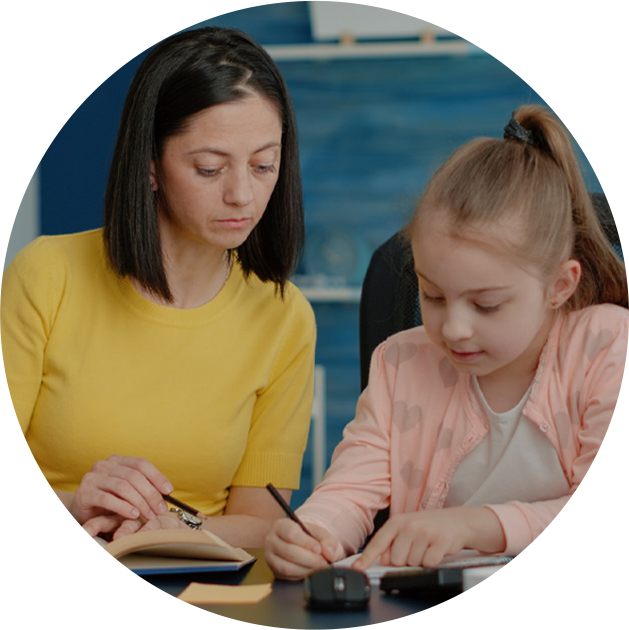
To get started with homeschooling, you must research and select the curriculum, choose between a private tutor or yourself as the primary educator, and set a schedule for the class.
Additionally, you need to set up tests and an examination structure.
Let's dive deeper into the step you must take to homeschool your ward.
Step one: Select the learning materials
Curriculum design is the first step of homeschooling. Your first option is to pick individual subjects, textbooks, and online resources to use for your child's education. The much more popular option is to pick a pre-designed homeschooling curriculum. By picking the latter, you don't subject your ward to your own blindspots. Moreover, you can tweak the program and add subjects and learning materials that you believe your child really needs.


After you've designed the curriculum and selected the learning materials, your next step should be to decide between yourself and a private tutor as the primary instructor.
You must first select the learning materials and the subjects so that you can decide genuinely if you can teach them in the first place. If you cannot, then you should hire a well-rounded
private tutor who can teach all the required subjects.

Regardless of whether you're the primary instructor or not, there must be a class schedule. It instills discipline and evokes seriousness toward one's education. A homeschooler shouldn't have a vague and highly negotiable schedule just because his parent can deliver instructions whenever he wants.


After you have gathered the learning materials and have a class schedule, you can start teaching. In case you have hired a private tutor for instruction, you must ensure that he sticks to the schedule too. With the child getting lessons at home, he is officially a homeschooler.
 >
>Most homeschooling programs come with examination
materials. You can also use past papers to create quizzes for your ward. With the right balance of instruction and testing, you can ensure that your child understands everything he is supposed to learn.
As long as you choose the right exam questions and format, you can consider your homeschooling setup to be complete.
Of course, homeschooling isn't an alternative to parenting. You still have the responsibility to socialize your kid, get him into activities, and encourage his hobbies. Those, however, don't come under the basic structure of homeschooling.
 >
>If you want to go beyond basic homeschooling, then you have to take a broader approach to your child's education. In this section, you will find tried and true tips that level up the quality of a homeschooling program. Follow these tips and tricks for first time online homeschoolers:
You must include at least two subjects that your child is interested in. These could range from music production to content creation. They don't need to be academically sound. As long as the interest subjects engage your ward, they should be included in his homeschooling curriculum.
Before you start teaching, you might want to check what kind of learner your child is. Learning style tests are available online and can guide you regarding the best way to educate your child.
You should design a socialization module so that your ward can make friends. This "module" entails making friends in the neighborhood as well as online. Homeschooling communities allow parents to connect their children in socially safe settings.
Regardless of how you design a homeschooling program, you should include foundational subjects in arithmetic, communication/language, and general science.
Sometimes, a child is naturally good at something that he isn't too interested in. It helps to encourage his gifts, and with homeschooling, it is actually possible.
Cambridge curriculum has Arts and Design subject while CBSE has a yoga subject. Most schools don't adopt these subjects, but their existence in academic curricula validates them. You can use the existing learning materials for extracurricular subjects and can bring them into the fold of your homeschooling curriculum.
Remember that your goal is to raise a well-educated individual. If you cannot communicate or explain concepts yourself, you can always ask for help. From private tutors to online educators, you have plenty of options that don't require conventional schooling.
If you've chosen the key subjects you really want your child to learn, don't confine his education to them only. Pick a well-rounded homeschooling program and fill in the rest of the subjects.
The tips above can optimize your child's homeschooling experience. With these tips and the steps mentioned earlier, you have everything you need to homeschool your child.
Also read, How Can Parents Help Their Children Succeed in Online Schools?
But there's one thing that you need to consider before you homeschool your child. And that's the legality of homeschooling in your state.
The requirements for homeschooling vary from state to state and country to country. For the most part, homeschooling is legal in most
democratic countries.
To legally homeschool your child in most geographic regions, you need to fulfill the following broad requirements.
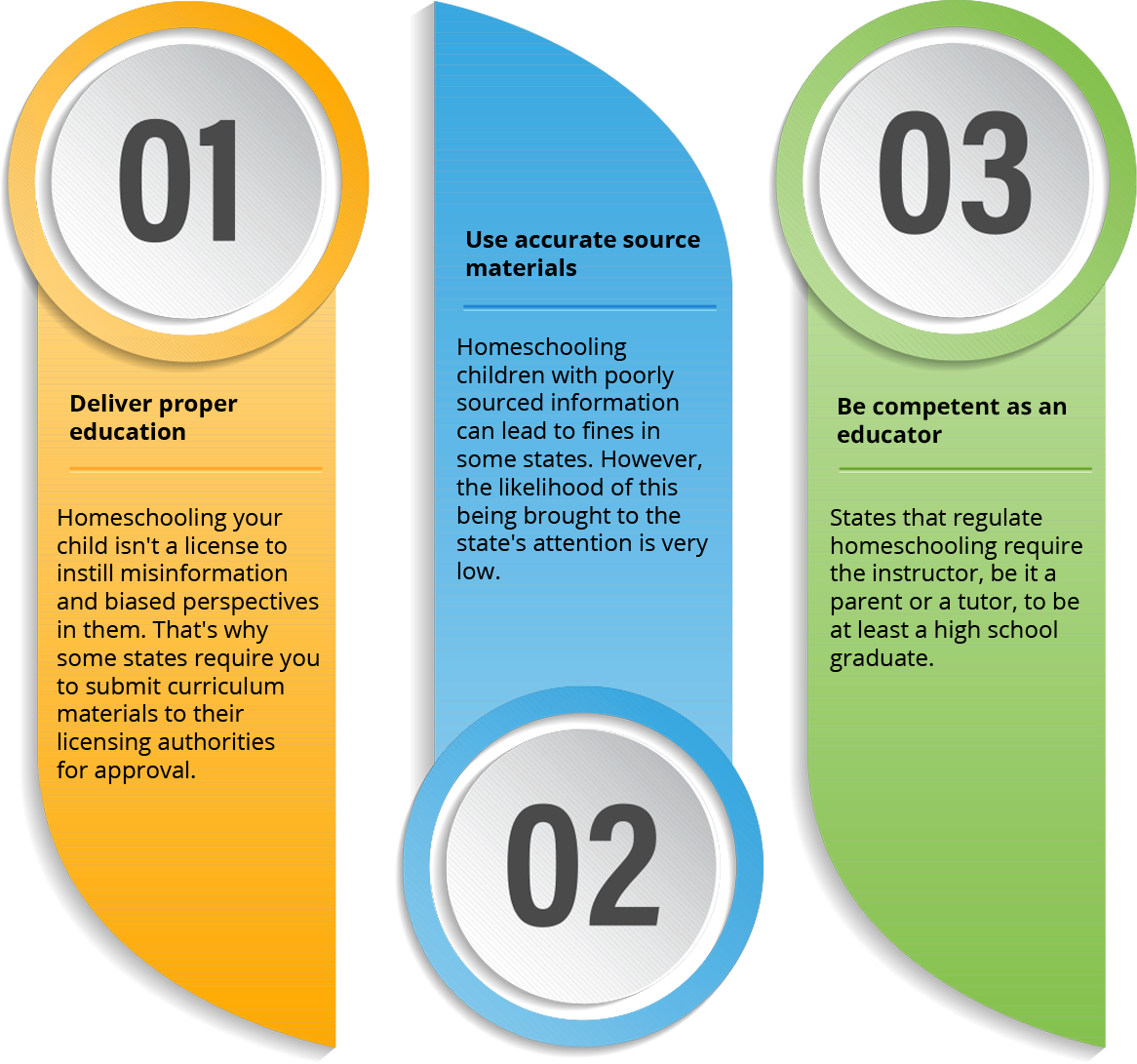
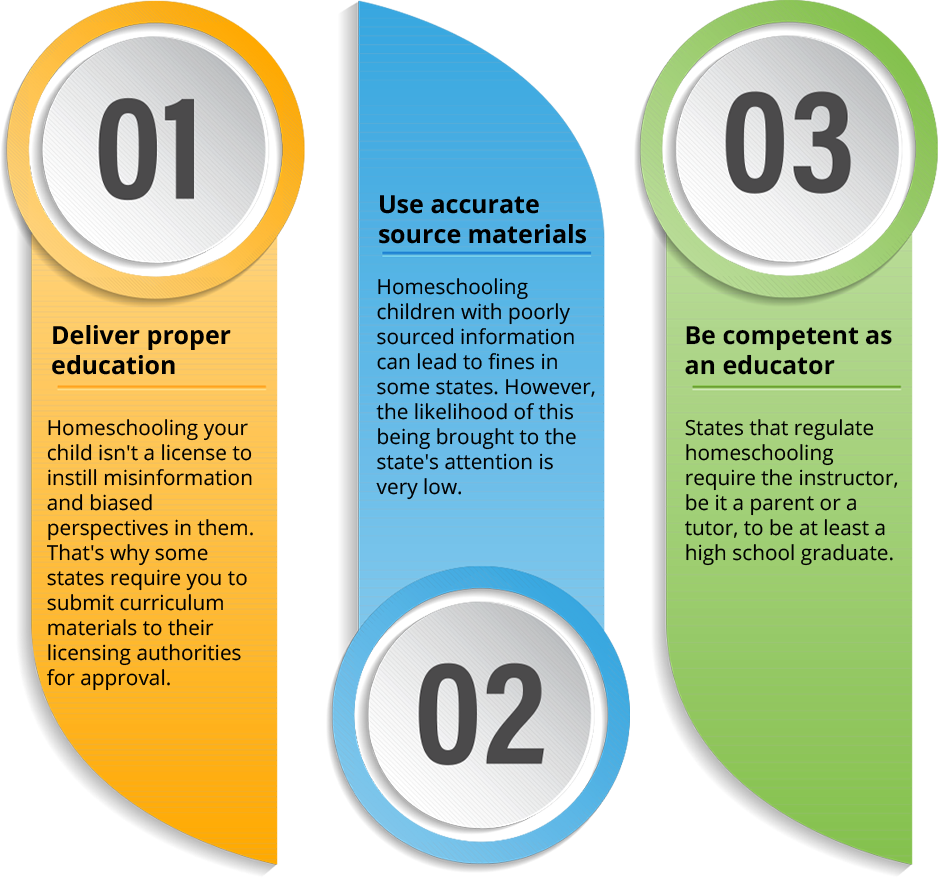
At this point, you might be wondering why the government has any say in how you educate your child. Well, regulating education is a
function of the state government. And to the extent that it supervises the quality of education in schools, it is bound to set some standards for homeschooling.
The more intrusive a government is in general educational matters, the more it concerns itself with homeschooling as well. California is one of the most restrictive states in the matter of homeschooling.
In most restrictive instances, homeschooling is legal, but the parents have to get their home registered as a private school. This fulfills the state requirement of all kids being sent to legal schools and the federally-acknowledged right of parents to direct their children's education.
As long as a state doesn't legally require children to attend legal schools, one can start homeschooling without any legal obstacles.
Legal obstacles are the least of your concerns when you're just getting into homeschooling. There are at least 12 challenges that you might need to overcome before you're in the clear.
Wondering how to enrol in 21K School? It all starts with filling the right form. Enrolment is open from Nursery to Grade 12 for the academic year 2023-24. Students will be enrolled based on first cum first serve, subject to the availability of seats.
| Problem | Context | Solution |
|---|---|---|
| Social isolation | Homeschooled students might not have as many friends | Enroll your children in summer camps and other social groups |
| Lack of extracurricular activities | Team activities and big-budget sports might be out of the reach of homeschoolers | You can enroll your ward in an activity-driven club. This also solves the isolation issue. 21K School has partnered with top sport academies and centres to offer the best possible education to our students. Learn more here. |
| Inconsistent learning resources | Learning resources in some subjects can be thin depending on the parent's own interest or knowledge. | Use a pre-designed homeschool program to ensure high-quality education at home. |
| Disconnect from culture | Students who don't go to school might feel disconnected from society at large. | Encourage your children to make friends outside of school. |
| Hyper-flexibility and discipline issues | If a homeschooler doesn't have a strict schedule, he might procrastinate or be non-serious about his education. | Maintain a non-negotiable schedule even though you can afford to change it around. |
| Roadbumps in instruction | You might not be able to teach some subjects properly. | Invite a private tutor wherever you need help. |
| Higher energy investment | Homeschooling your child is a full-time job. | Ensure that at least one parent stays at home. |
| Inefficient use of time | If you juggle homeschooling with a full-time job, you might use your time inefficiently. | Again, make sure that the parent responsible for teaching treats it as a full-time job. |
| Possible burnout | With the responsibilities of teaching every subject, the parent might experience burnout. | Take breaks and avoid overexerting yourself. |
| Curriculum blindspots | You might miss out on key subjects when designing the homeschooling curriculum. | Use a standard homeschooling program as a foundation for the bespoke curriculum. |
| Academic Recognition problems | Colleges and universities might be harder to get into for homeschoolers. | Make sure your child gives independent standardized exams as soon as he is eligible. |
| Legal obligations | Some states require homeschooling parents to submission of progress reports as well as curriculum content. | Hire a VA on Fiverr or Upwork to help with the paperwork. |
Of all the problems mentioned above, one that stands out is the difficulty of getting higher education. Colleges and universities are biased in favor of standard education. So, a homeschooler's application might not be taken as seriously by some higher education institutions. But that doesn't mean that colleges don't accept homeschooling.
Also read, How to successfully transition from a traditional classroom experience to a homeschool high school?
The best homeschool program is one that works well for your child. 21K School focuses on the overall development of a child making him or her future-ready. We realise that mastery of the "3 R's" (reading, writing, and arithmetic) is no longer enough, nor is the superficial recollection of facts. What is needed is deeper learning of content through its application in solving real-life issues. Also, content knowledge needs to be complemented with the purposeful development of critical skills (problem-solving, creativity, communication, collaboration) and universal human values (empathy, positivity, equanimity, and the ethic of excellence). Learn more on what sets us apart from other homeschooling program.
There are hundreds of subject-specific homeschooling curricula if you are looking for one. Let's look at the top homeschool programs that you can use to educate your child without the help of external tutors.

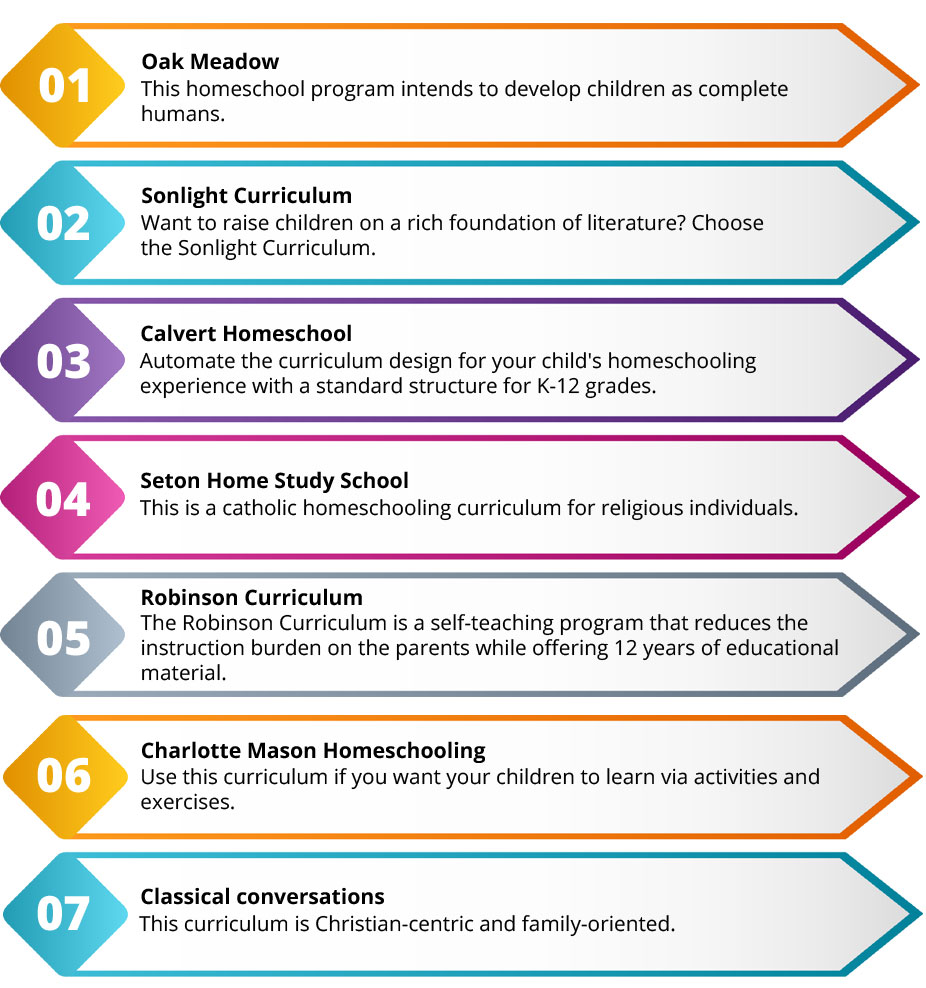
In the programs covered above, all you get is a syllabus and educational materials. You have to either hire a private tutor or play the role of your child's sole teacher. If this seems daunting, but you still want the benefits of homeschooling, then you should look at online learning
opportunities at home.
21K School offers the benefits of homeschooling without the drawbacks. Parents can choose between a standard board-affiliated curriculum or pick specific subjects for the child. But unlike homeschooling, the parent doesn't have to be the full-time teacher.
21K School is a great alternative to homeschooling your ward yourself. Here are the contexts in which you might want to enroll your child in 21K School.
You're homeschooling because of education fees - Modern schools can have fees so high they border on extortion. One of 21K School's values is making education affordable while maintaining award-winning standards.
Visit the following link for a detailed break up of our fees:
- Indian Curriculum Fees
- American Curriculum Fees
- British Curriculum Fees
You're homeschooling because of regional limits - If the schools in your area aren't good enough, you can still get your child in 21K School's online classroom.
You're homeschooling to offer updated education - 21K School offers advanced learning materials and up-to-date education.
You're homeschooling because of a bully-free environment - When enrolled in 21K School, your child learns from home.
You're homeschooling for personal oversight - 21K School offers a higher degree of control of oversight of children's education to their parents.
You're homeschooling for your ward's comfort - 21K School students don't have to leave their homes for their education.
In other words, 21K School is the closest thing to homeschooling with professional standards. The school is affiliated with multiple boards and has received international acclaim for its curriculum quality, instruction, and learning materials.
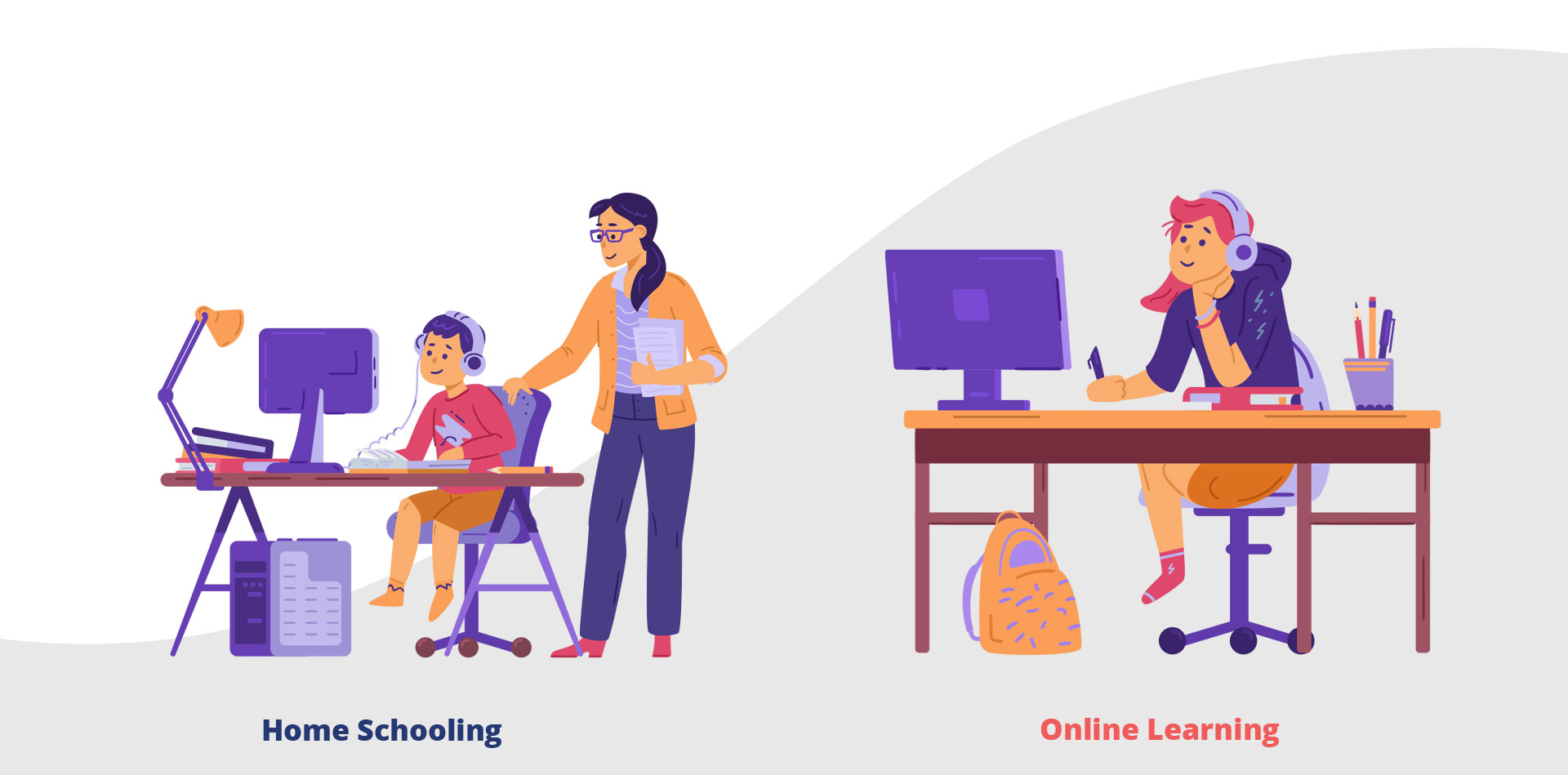
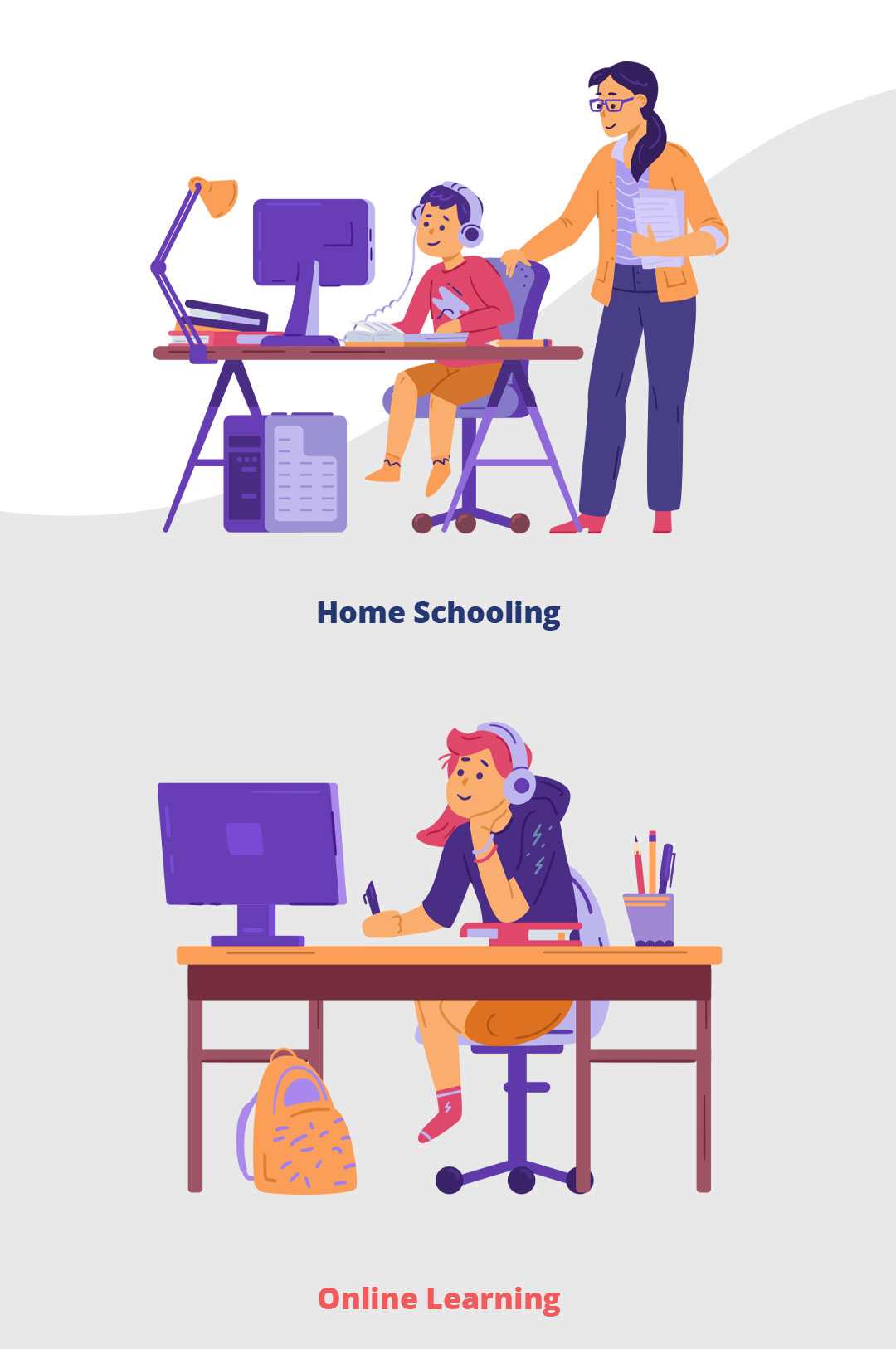
So far, we have discussed homeschooling, its merits and demerits, and how you can get started in it. It is evident that schooling is a solution to the problems of modern education. But it isn't the only solution. Online learning is the number one competitor for homeschooling when it comes to alternative education methods.
Homeschooling is primarily parent-driven at-home education, while online learning is teacher-driven at-home learning. Homeschoolers are usually taught by their parents, while online learners get guidance from remote instructors.
Homeschoolers get homeschool diplomas, while online learners can get GED, Board-affiliated standard school certificates, and even
bachelor's degrees depending on the level at which they are learning. Homeschooling is cut off at the college level, while online learning can continue in graduate and post-graduate studies.
Homeschooling is cheaper than online school in a one-income household. If there is a stay-at-home parent who can teach the child, paying an online teacher might be redundant.
Homeschooling also offers greater curriculum control to the parents. While online schools allow parents to choose subjects that they want for their children, they do not allow the curation of individual learning materials.
Students who attend an online school make friends, get higher academic recognition, and have a broader scope after graduation. Moreover, online schools take away the burden of education from the parents.
Online schools like the 21K School combine the advantages of traditional education with the best things about homeschooling. Your ward gets to enjoy learning from home, a bully-free environment, and up-to-date learning materials, without the isolation and the off-standard education of self-schooling.
Does that mean all homeschoolers must be enrolled in online schools? Not really. It all depends on the individual circumstances.
